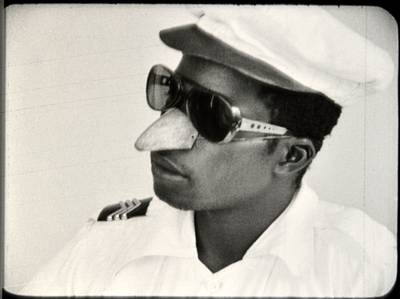Arsenal Cinema, Berlin, Germany
30 Mar 2014

MUEDA, MEMORIA E MASSACRE, 1979
“Visionary Archive” is a collaborative translocal experiment: Phases and facets of African cinema are being researched in five localities. The relationship between phenomena related to film history in Cairo, Khartoum, Johannesburg, Bissau and Berlin is being formulated and examined.
The term “African cinema” is an open bracket in which historical echoes come into their own, as do open questions. Findings and films will be regularly discussed with different audiences, and in spring 2015 the project will culminate in a comprehensive closing program in Berlin.
Re-encounters with African cinema in joint film viewing sessions are a central component of Visionary Archive. On Sunday, 30th March, five South African artists will come together for a screening at Arsenal Kino. They are currently resident artists of the Constanza Macras/Dorky Park’s performance project “on Fire” in Berlin. The films MUEDA, MEMORIA E MASSACRE (Mozambique 1979) and COME BACK, AFRICA (SA/USA 1958) will open up associative approaches to discuss body politics, working on history and the role of performance art in “stating the plurality of singularity” (A. Mbembe) in southern Africa.
Visionary Archive: It all depends #2
March 30, 12 pm–6 pm, Arsenal Cinema 2
Language: English
Guests:
Lucky Kele, Mmakgosi Kgabi, Zanele Muholi, Mamela Nyamza, Lerato Shadi
Moderation:
Marie-Hélène Gutberlet, Tobias Hering
MUEDA, MEMORIA E MASSACRE Ruy Guerra, Mozambique 1979, 35 mm, 75 min, OV/EnS
The film was shown at the Forum in 1981, is the only Mozambican film in the Arsenal archive, it is a clear milestone. It shows a piece of anti-colonial reminiscence work, a public reenactment staged by non-professionals of the massacre of Mueda (1960) carried out by the Portuguese. The event was regarded as triggering armed resistance in Mozambique in subsequent historiography and was remembered at regular intervals even before independence by means of popular reenactments. Ruy Guerra shot MUEDA with a clear documentary interest in this theatrical form of commemorative practice. Its subsequent marketing as the “first Mozambican feature film“ provided an initial taste of the interpretational conflict that was to follow, which resulted in a complicated history of censorship.
COME BACK, AFRICA Lionel Rogosin, South Africa/USA 1958, DCP, 86 min, OV/GeS
Lionel Rogosin, an US-American director, filmed COME BACK, AFRICA in the late 1950s in Johannesburg. The result was a film that is exemplary in its depiction of the black urban experience under Apartheid. The film tells the story of Zachariah Mgabi who leaves his rural home to find work in Johannesburg. As the film progresses Zachariah moves from job to job, working in the mines, as a domestic worker and at a car garage. In violation of apartheid’s racial pass laws, he is arrested by the police. Once out of prison, he finds out that his wife has been murdered.
MATSOGO Lerato Shadi, South Africa 2013, Digital file, 5 min, without dialogue
A recent video work by Lerato Shadi, in which she crumbles a slice of chocolate cake with her fingers and then slowly rolls the crumbs together to form a triangular shape that resembles the original slice, eloquently asks the key questions of how we construct and perceive form and meaning. The final shape recalls a slice of cake, and is constituted of exactly the same elements, but it is also not a slice of cake.